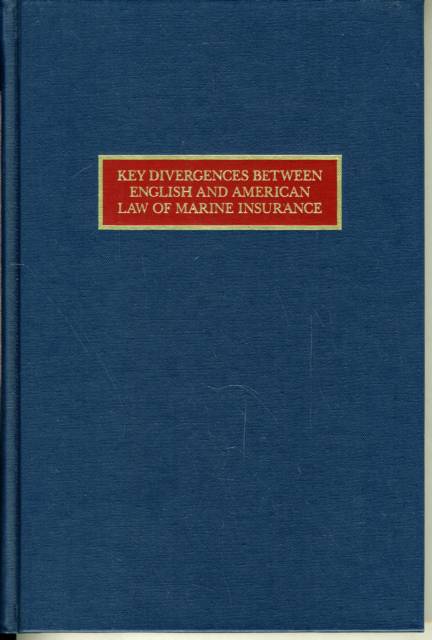
Bedankt voor het vertrouwen het afgelopen jaar! Om jou te bedanken bieden we GRATIS verzending (in België) aan op alles gedurende de hele maand januari.
- Afhalen na 1 uur in een winkel met voorraad
- In januari gratis thuislevering in België
- Ruim aanbod met 7 miljoen producten
Bedankt voor het vertrouwen het afgelopen jaar! Om jou te bedanken bieden we GRATIS verzending (in België) aan op alles gedurende de hele maand januari.
- Afhalen na 1 uur in een winkel met voorraad
- In januari gratis thuislevering in België
- Ruim aanbod met 7 miljoen producten
Zoeken
Key Divergences Between English and American Law of Marine Insurance
Thomas J Schoenbaum
Hardcover | Engels
€ 55,95
+ 111 punten
Omschrijving
From the time of Elizabeth I in the second half of the sixteenth century, London has dominated the marine insurance markets. This led the English to develop a law of marine insurance as well. A Chamber of Assurances was established in England in 1575, and the law of marine insurance, rooted in custom, developed through the cases decided by the courts. In the United States, marine insurance underwriting began in the eighteenth century, although British firms continued to dominate. The American law of marine insurance took its cue from English law; there was no American statute, and English legal precedents were cited routinely in American courts. For fifty years after the English law was codified in the Marine Insurance Act 1906 (MIA), it could truly be said that there was a unified Anglo-American law of marine insurance, and that English law was part of the "general maritime law" of the United States. The unity of the Anglo-American law, which was so beneficial to the international marine insurance industry, was broken abruptly in 1955 by the decision of the United States Supreme Court in Wilburn Boat v. Fireman's Fund Insurance Co., a case that created controversies over the uniformity of the law that have yet to subside. The purpose of this work is to explore the extent of the breakdown of the uniformity of the law and to point to its cure.
Specificaties
Betrokkenen
- Auteur(s):
- Uitgeverij:
Inhoud
- Aantal bladzijden:
- 224
- Taal:
- Engels
Eigenschappen
- Productcode (EAN):
- 9780870335228
- Verschijningsdatum:
- 31/07/2009
- Uitvoering:
- Hardcover
- Formaat:
- Genaaid
- Afmetingen:
- 158 mm x 236 mm
- Gewicht:
- 498 g

Alleen bij Standaard Boekhandel
+ 111 punten op je klantenkaart van Standaard Boekhandel
Beoordelingen
We publiceren alleen reviews die voldoen aan de voorwaarden voor reviews. Bekijk onze voorwaarden voor reviews.









